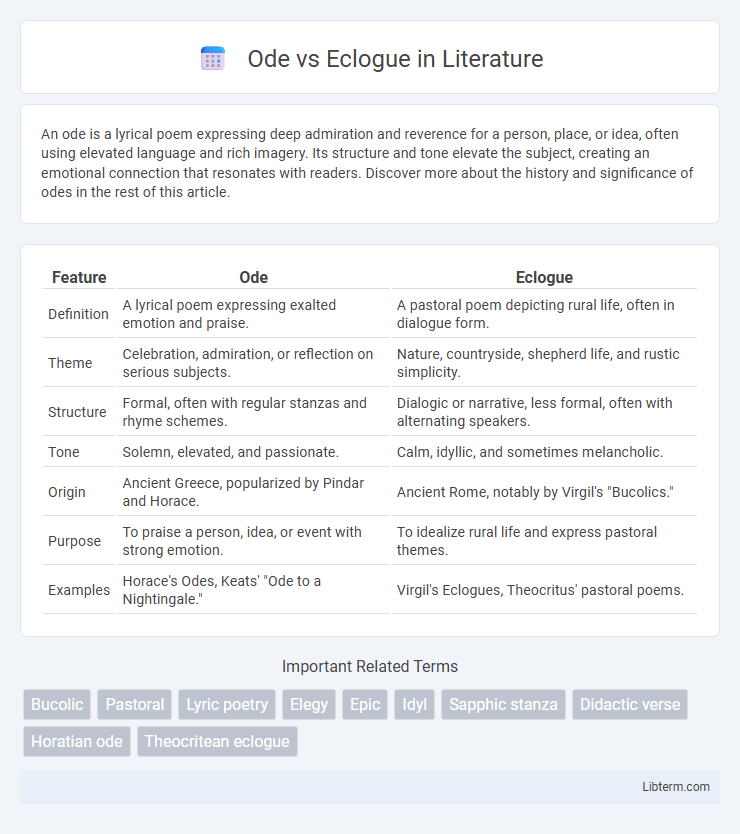An ode is a lyrical poem expressing deep admiration and reverence for a person, place, or idea, often using elevated language and rich imagery. Its structure and tone elevate the subject, creating an emotional connection that resonates with readers. Discover more about the history and significance of odes in the rest of this article.
Table of Comparison
| Feature | Ode | Eclogue |
|---|---|---|
| Definition | A lyrical poem expressing exalted emotion and praise. | A pastoral poem depicting rural life, often in dialogue form. |
| Theme | Celebration, admiration, or reflection on serious subjects. | Nature, countryside, shepherd life, and rustic simplicity. |
| Structure | Formal, often with regular stanzas and rhyme schemes. | Dialogic or narrative, less formal, often with alternating speakers. |
| Tone | Solemn, elevated, and passionate. | Calm, idyllic, and sometimes melancholic. |
| Origin | Ancient Greece, popularized by Pindar and Horace. | Ancient Rome, notably by Virgil's "Bucolics." |
| Purpose | To praise a person, idea, or event with strong emotion. | To idealize rural life and express pastoral themes. |
| Examples | Horace's Odes, Keats' "Ode to a Nightingale." | Virgil's Eclogues, Theocritus' pastoral poems. |
Introduction to Odes and Eclogues
Odes are lyrical poems characterized by their formal structure, elevated style, and expression of intense emotions, often addressing a particular subject or praising a person or concept. Eclogues are pastoral poems that depict rural life, often through dialogues between shepherds, emphasizing themes of nature, simplicity, and rustic beauty. Both forms originated in classical literature, with odes tracing back to Pindar and Horace, while eclogues are primarily associated with Virgil's Bucolica, reflecting contrasting poetic focuses on grandeur versus pastoral idealization.
Historical Origins of Odes and Eclogues
Odes originated in ancient Greece as lyrical poems performed with musical accompaniment, closely associated with poets like Pindar and Horace who shaped the form into elaborate expressions of praise and reflection. Eclogues, also known as pastoral poems, trace their roots to Latin literature, especially the works of Virgil, who established the genre through idealized depictions of rural life and shepherd dialogue during the Roman Republic. Both forms evolved to influence European Renaissance poetry, with odes maintaining a grandiose style and eclogues emphasizing bucolic tranquility.
Defining Features of the Ode
Odes are lyrical poems characterized by their formal structure, elevated style, and focus on praising or glorifying a person, event, or abstract concept, often employing stanzas with uniform metrical patterns and intricate rhyme schemes. Unlike eclogues, which are pastoral and dialogic poems centered on rustic life and shepherds, odes emphasize personal reflection and emotional intensity, utilizing rich imagery and varied stanza forms such as the Pindaric, Horatian, or Irregular ode. The defining features of the ode include its solemn tone, elaborate diction, and a theme that explores universal ideas like beauty, truth, or heroism.
Key Characteristics of the Eclogue
Eclogues are pastoral poems typically featuring dialogues between shepherds and idealized rural settings, emphasizing nature, love, and rustic life. They often employ a simple, lyrical style with themes of harmony between humans and the natural world, contrasting with the more elevated tone and varied subjects of odes. Core elements include bucolic imagery, conversational structure, and a focus on simplicity and nostalgia.
Thematic Differences Between Odes and Eclogues
Odes primarily explore themes of personal reflection, praise, and lofty emotions, often addressing abstract concepts or celebrating individuals and events with elevated language. Eclogues, in contrast, delve into pastoral life, focusing on rural settings, shepherds, and nature, frequently presenting dialogues that explore love, loss, or rustic simplicity. This thematic divergence highlights odes' formal and solemn tone versus eclogues' conversational and bucolic character, reflecting distinct poetic traditions within classical literature.
Prominent Poets and Their Influences
Odes, perfected by poets like John Keats and Pindar, emphasize formal structure and elevated emotion, influencing Romantic and classical poetry through rich imagery and personal reflection. Eclogues, rooted in Virgil's pastoral tradition, showcase dialogues between shepherds, shaping pastoral poetry and inspiring Renaissance poets such as Edmund Spenser. Both forms profoundly impact poetic expression, with odes highlighting individual sentiment and eclogues celebrating rural life and nature.
Structural Distinctions: Ode vs Eclogue
Odes exhibit a formal structure with stanzas often following specific metrical patterns and rhyme schemes, emphasizing a lyrical and elevated tone. Eclogues are structured as dialogues or monologues set in pastoral environments, typically featuring alternating verses and simpler metrical forms that reflect rustic speech. The ode's complexity contrasts with the eclogue's conversational style, highlighting their distinct literary functions and thematic focuses.
Language and Style Comparison
Odes employ elevated, formal language with intricate meter and rich imagery to evoke strong emotions, showcasing a highly structured and lyrical style. Eclogues feature simpler, conversational language that reflects pastoral settings and natural speech, often using dialogue between shepherds to convey themes of rural life. The style of eclogues is more narrative and free-flowing compared to the ceremonial and elaborate diction found in odes.
Impact on Literary Traditions
Odes have profoundly shaped lyrical poetry by emphasizing personal emotion and elaborate structure, influencing Romantic and Victorian poets to explore introspection and nature. Eclogues, rooted in pastoral themes, established a tradition of idealizing rural life that inspired Renaissance and Neoclassical writers to blend realism with allegory. Both forms collectively enriched literary traditions by offering distinct modes of expression--emotional depth in odes and thematic pastoral reflection in eclogues--that persist in contemporary poetry.
Conclusion: Choosing Between Ode and Eclogue
Selecting between an ode and an eclogue depends on the desired poetic form and thematic focus; odes are suited for expressing elevated emotions and personal praise, while eclogues excel in depicting pastoral themes and dialogues. Understanding the intent of the poem--whether to celebrate an individual or explore rural, idyllic life--guides the optimal choice. Both forms hold unique stylistic features that enhance different literary expressions, making the choice pivotal for effective poetic communication.
Ode Infographic

 libterm.com
libterm.com